Reflecting on the Critical Intersections Webinar
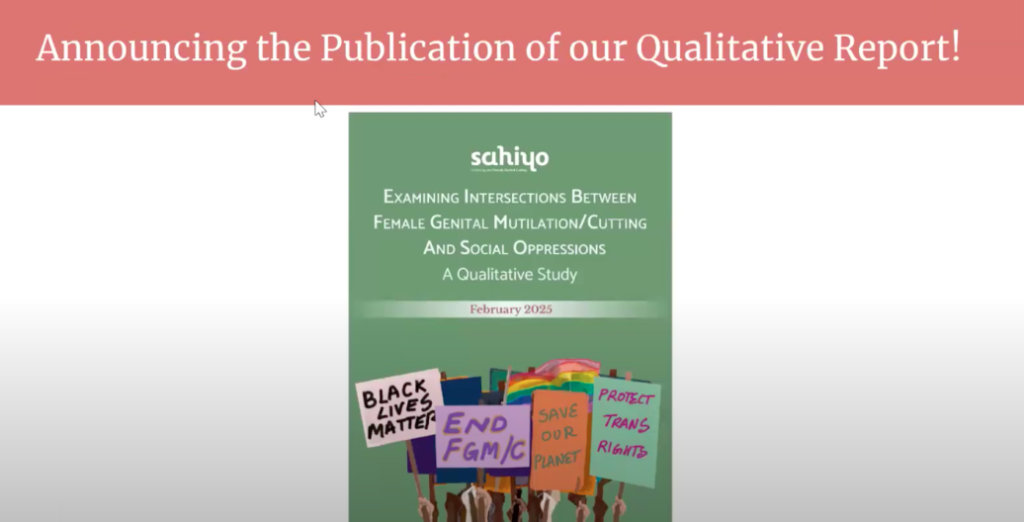
On February 27th, Sahiyo’s Research Coordinator Rachel Wine, and Executive Director Mariya Taher led the webinar, “Intersectional Approaches Strengthen Alliances and Build Movements to End FGM/C,” to announce the publication of the third and final report for Sahiyo’s Critical Intersections Research Project project, Examining Intersections Between Female Genital Mutilation/Cutting and Social Oppressions: A Qualitative Study. The event explored Sahiyo’s Critical Intersections Research Project from its inception in 2021 to the present in 2025. Mariya shared how a 2021 webinar focused on how racism impacted the movement to end FGM/C inspired the Critical Intersections research project. While, Rachel gave an overview of the findings from our first two reports: Examining the Current State of Critical Intersections: Female Genital Mutilation/ Cutting and Social Oppressions Examining Intersections Between Female Genital Mutilation/Cutting and Social Oppressions A Mixed Methods Study Throughout the course of this three-year project, many researchers supported the work and they too shared their experiences during the webinar with partner researcher Naquia highlighting the key intersections found in this newest report: race/racism, LGBTQIA+ issues, gender inequities, and religious discrimination. Another partner researcher Jessica Puri and Project Advisors Aarefa Johari and Saza Faradilla spoke about their experiences with intersectionality in their own work surrounding FGM/C, and how the findings from the report can strengthen the movement to end FGM/C. In specific, Aarefa discussed how religion intersects with FGM/C in India, and Saza touched on the benefits of framing FGM/C through the lens of gender to recognize FGM/C is a form of gender-based violence. Naquia spoke to the framing aspect and asked readers of the report to consider the importance of language and the complex nature of FGM/C when engaging in activism to end it Rachel ended the webinar, by uplifting the four recommendations from the report: To coordinate with social service sectors across various social justice issues Improve language and framing of FGM/C Increase education on how FGM/C is intersectional Implement more diverse and equitable approaches to data collection, analysis, and dissemination Each recommendation was accompanied by a suggested action item for those in the FGM/C sphere to help them incorporate intersectionality into their approaches and advocacy. As the anti-FGM/C field looks to the future of their work, the Critical Intersections Research Project makes it clear that intersectional collaboration is crucial to creating social change and ending this human rights violation. Watch the webinar recording here. Learn more about the Critical Intersections Research Project here.
Sahiyo research uplifts how intersectionality impacts the movement to end FGM/C this February 6th
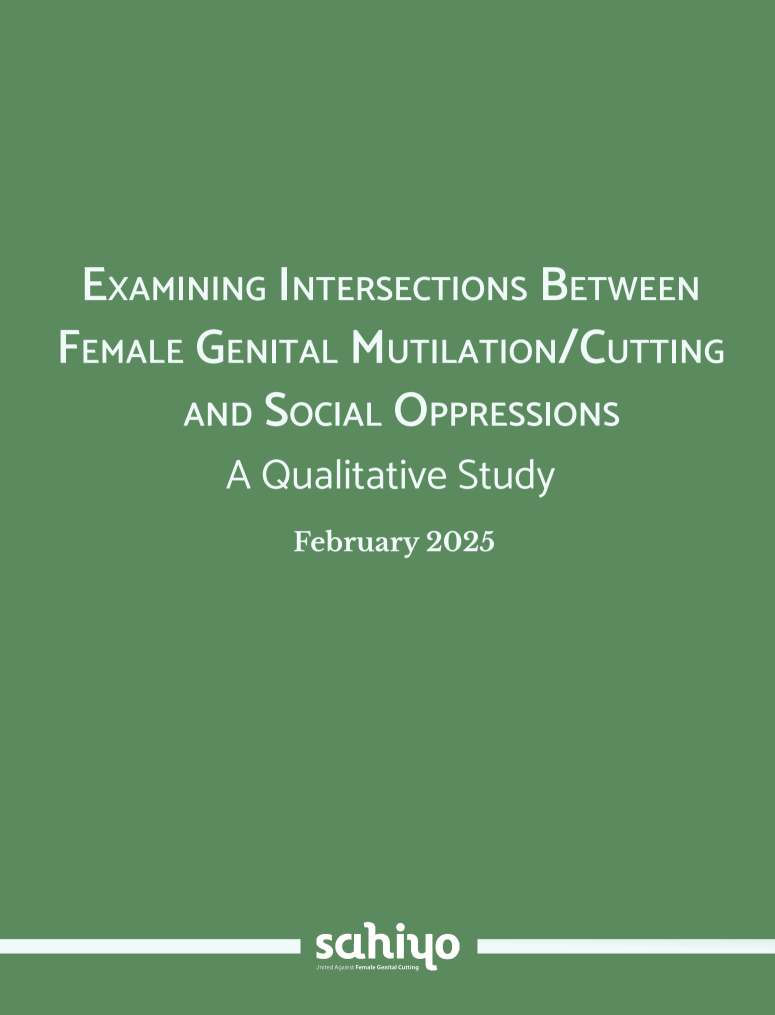
In recognition of Feb 6th, International Day of Zero Tolerance to End FGM/C, and this year’s theme “Stepping up the Pace: Strengthening Alliances and Building Movements to End FGM,” our upcoming publication of Sahiyo’s third and final Critical Intersections Research Project report Examining Intersections Between Female Genital Mutilation/Cutting and Social Oppressions: A Qualitative Study could not be more timely. Our report’s findings reinforce the vital importance of recognizing intersectional identities and oppressions, as well as prioritizing the need to build cross-movement collaboration to strengthen the movement to end FGM/C. Overall, our research reveals through extensive data and testimonials that we are stronger when we work together, contrasting the harmful and discriminatory rhetoric coming from the Trump Administration. Expanding on the findings of our first two reports, this body of work includes insights derived from in-depth interviews conducted with 29 key experts across various social justice fields. The interviews were conducted across multiple geographic regions virtually via Zoom from November 2022 to February 2023. Two clear themes emerged: Intersectionality and Cross Collaboration. The report addresses the following topics within these two themes: Intersections between FGM/C and Race, LGBTQIA+, Religion, and Gender. Challenges and Opportunities to Cross Collaboration. From these findings, four recommendations were derived to address FGM/C: Coordinate with social service sectors across various social justice issues to improve support and resources for survivors. Improve language and framing of FGM/C to limit racialization and/or exclusion of marginalized communities in terms of who is impacted by FGM/C. Increase education on how FGM/C is intersectional within anti-FGM/C organizations, as well as across different movements/sectors. Implement more diverse and equitable approaches to data collection, analysis and dissemination that include input from a diverse array of stakeholders. Don’t miss our webinar, Intersectional Approaches Strengthen Alliances and Build Movements to End FGM/C, to learn more about the three-year project. Date/Time: February 27 @ 10-11:30 AM ET Registration link: https://bit.ly/FGMCAlliances Description: This webinar, which is both a culmination of the Critical Intersections Research Project and a charted path forward, will loop in key players from throughout the project to share their experiences and explore key findings that emphasize how intersectional approaches in ending FGM/C, including building alliances and partnerships with other social justice movements, strengthens our overall work to end FGM/C. Speakers: Aarefa Johari is a journalist and feminist activist based in Mumbai, India. She has been advocating for an end to Female Genital Cutting since 2012 and is a co-founder of Sahiyo, an organisation working to end FGC. Saza Faradilla (she/they) is a co-founder of End Female Genital Cutting Singapore, which envisions a world where the practice of FGC is obsolete. She raises awareness on social media and on-the-ground, and participates in local and international lobbying at the United Nations to bring attention to the fact that FGC is a pressing concern in Asia. Equally important, she calls for a culturally-contextual and intersectional feminist approach when dealing with sexual and gender based violence across diverse Asian communities. Jessica Puri is an Adjunct Professor of Public Health and founder of The Parable Lab. Nicknamed a Creative Academic, she enjoys the pursuit of knowledge and rest through creative expression and storytelling. Naquia Unwala is currently a medical student at Georgetown University School of Medicine. She is also a Research Associate at Cornell University where she studies homelessness, public health disasters, and urban politics. Naquia is a volunteer at Sahiyo, and has helped with leading qualitative analysis of the Critical Intersections Research Project. Critical Intersections: Since 2021, through our survivor and advocate-led Critical Intersections Research Project, Sahiyo has sought to understand how systems of oppression have delayed progress toward ending female genital mutilation/cutting (FGM/C), as well as explored the potential to build collaboration with other social justice movements to increase advocacy work on ending FGM/C. Inspired by a webinar in 2021 that sought to specifically examine the impact of systemic racism on the movement, this three-stage mixed-methods project has expanded that initial scope to understand the interplay between FGM/C and other oppressive forces such as Islamaphobia, xenophobia, transphobia, gender discrimination, and more. A special thank you to the Wallace Global Fund for funding this project!
Critical Intersections Research Shifts Towards Implementation of Findings in Technical Assistance Trainings
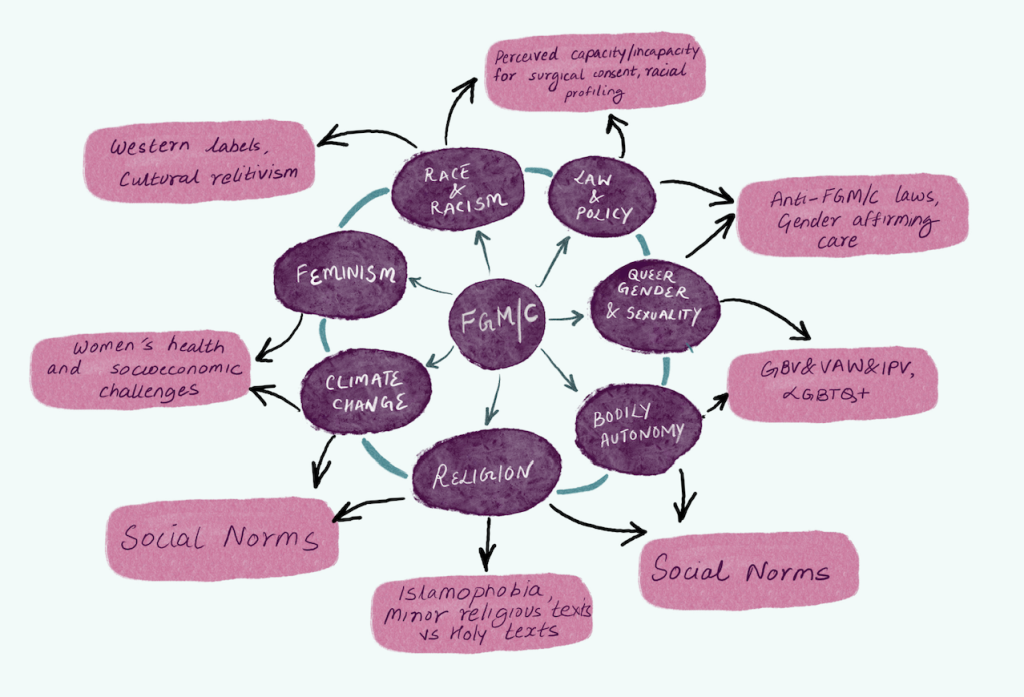
By: Rachel Wine This month, Sahiyo led two trainings to expand the impact of the findings of our Critical Intersections Research Project within the greater gender-based violence (GBV) sphere. While FGM/C is widely considered a form of GBV, research has indicated that anti-FGM/C work largely exists in a vacuum, and is not often incorporated into mainstream GBV work. To create change, Sahiyo created training that could introduce the importance of building collaborative relationships based on understanding the intersectionality of our siloed issues. Our first training, Critical Intersections: Anti-Racism and FGM/C, requested by ICASA, took place on January 14. Research findings indicated a need to better understand the racialization of FGM/C and associated discrimination to create stronger systems of care for individuals impacted by FGM/C within the U.S. To address these gaps, we uplifted findings that spoke to how FGM/C is impacted by race and racism in both its continuation in generation after generation and when it comes to advocates working to address FGM/C within the field. We also discussed recommendations from our research that can support organizations to adapt and incorporate anti-racist approaches when it comes to addressing FGM/C. The second training, Addressing Intersectionality: Fostering Collaboration in FGM/C and GBV Work, requested by AshaKiran was held on January 16. The presentation focused on identifying how and in what ways FGM/C is showing up in the U.S. and how populations are impacted by it, and illustrated findings that spoke to the need to build capacity for collaboration on FGM/C work within various GBV organizations. The training also shared existing models where intersectional collaborations have proven successful when it comes to addressing the larger topic of what perpetuates gender-based violence (regardless of whether we are speaking about FGM/C, domestic violence, sexual assault, and so forth). If your organization is interested in hosting a Critical Intersections Technical Training, please email Sahiyo’s Research Coordinator rachel@sahiyo.org.
A Conversation On Intersectionality: Sahiyo and The U.S. Network Launch Pilot Project

We are eager to uplift an ongoing collaboration between Sahiyo U.S. and the U.S. End FGM/C Network. Inspired by the U.S. Network’s upcoming release of its Survivor Listening Session Summary Report and Sahiyo U.S.’s ongoing Critical Intersections Research Project, the two entities have joined forces for a pilot project around intersectionality and FGC. In May, the U.S. Network and Sahiyo began sending out bi-weekly discussion questions to both organization’s respective listservs; these questions prompt activists and allies within the anti-FGC field to consider intersections between different social oppressions and FGC. Topics addressed by the questions include ties between FGC and religion, the conflation of gender-affirming care and FGC, racial stereotyping, and more. The goals of this initiative are as follows: To gather insight on various intersectional challenges from members of the Network. To share these responses with other stakeholders outside of the Network to facilitate dialogue on the topic of intersectional approaches to ending FGC. If you are interested in any of the topics listed above and want to be a part of these conversations, please email either Caitlin LeMay of the U.S. Network (caitlin@endfgmnetwork.org) or Rachel Wine of Sahiyo (rachel@sahiyo.org) for more information. To learn more about Sahiyo’s Critical Intersections project, click here.
Headline: Understanding the Critical Intersections of FGM/C with other social injustices: Encouraging dialogue on cross-movement collaboration
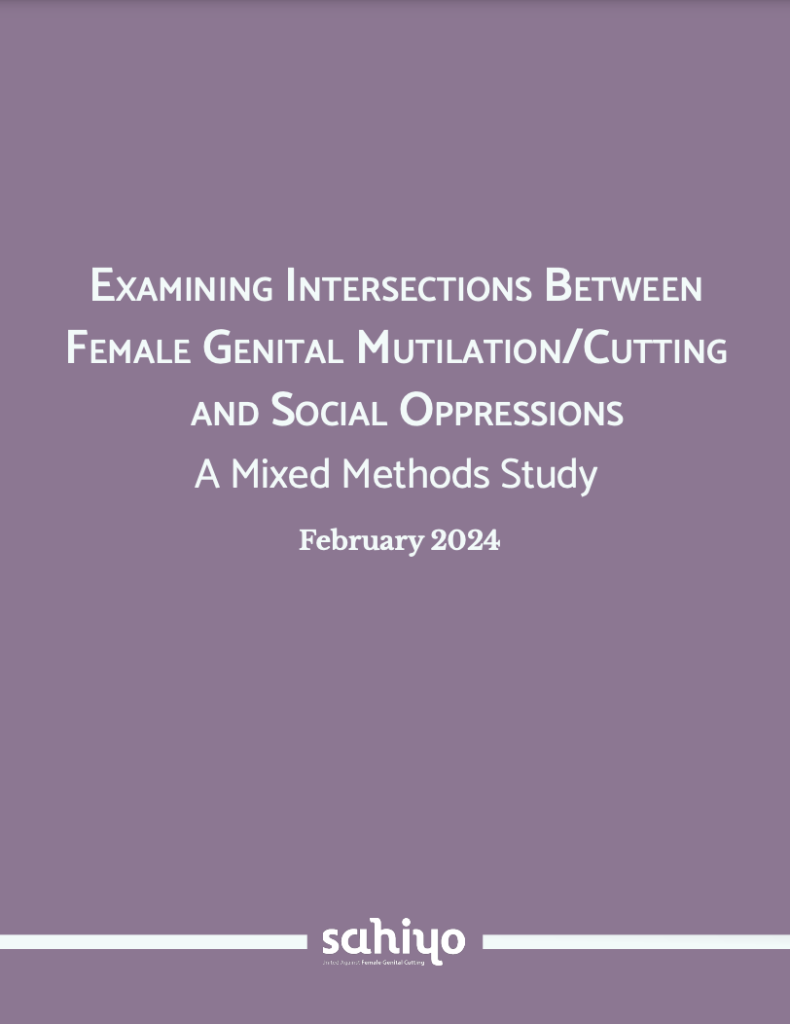
In April, Sahiyo’s research team gave two presentations exploring data from our advocate and survivor-led Critical Intersections Research Project, the latest report from this project having been released in February 2024. On April 23rd, Sahiyo presented Critical Intersections of FGM/C: The Value of Intersectionality in Cross-Collaboration in conjunction with API-GBV to attendees belonging to various gender-based violence organizations. This presentation fostered lively conversations around intersectionality and cross-collaboration, with one attendee asking about potential collaborations between the anti-FGM/C sphere and those working to end human trafficking. Overall, attendees reflected upon the interconnectedness of their various foci according to intersectionality. The second presentation, on April 24th, was in collaboration with the World Bank Group’s FGM Legal Working Group. Critical Intersections of FGM/C: Law and Policy in Systems of Oppression found attendees drawing on their current work, and how to interconnect to the issue of FGM/C. Concrete ideas emerged as to how to build cross-collaboration, including one participant emphasizing the simple action of referencing FGM/C in proposals to uplift the interconnection of the issue with other reproductive health and/or gender-based violence work. Our interactive presentations support organizations to engage in the following: To build holistic programs that identify intersectional needs of FGM/C survivors To identify components of building successful collaborations across organizations focused on different social oppressions (i.e. systemic racism and FGM/C) To compile tools, resources, case studies, and more that illustrate how cross-collaboration can be carried out within the larger social justice field If you and your organization would like to schedule a presentation or workshop, reach out to Rachel Wine at rachel@sahiyo.org. You can also learn more by visiting Sahiyo.org!
Critical Intersections of FGM/C: Law and Policy in Systems of Oppression Presentation

Sahiyo is excited to announce an upcoming event tied to our survivor and advocate-led Critical Intersections Research Project! This original research, which has been in development for over two years, examines the issue of female genital mutilation/cutting (FGM/C) through an intersectional lens. This includes an analysis of media on the topic (published in our first report), as well as data from a mixed-methods survey (published in our second report) and in-depth qualitative interviews (to be published later in 2024). The project seeks to understand both challenges that FGM/C survivors and activists face, as well as opportunities for cross-sector collaboration with other social justice movements. Critical Intersections of FGM/C: Law and Policy in Systems of Oppression is hosted by the World Bank Group’s FGM/C Legal Working Group. This presentation will center findings from Sahiyo’s research related to FGM/C, with a focus on various oppressive systems and their impact on FGM/C survivors and advocates; law and policy will be discussed within the context of religion, race/racism, and xenophobia. An intersectional framework highlights the need for those working within the FGM/C sphere to understand the complex nature of identity and its impact on the survivor experience, as well as anti-FGM/C activists to understand how their advocacy work may interact with other social justice movements. This data introduces multifaceted challenges created by intersecting social oppressions, and encourages participants to think of new possibilities. Event Date: April 24th Event Time: 12:00-1:00 PM EST Webinar link: https://teams.microsoft.com/dl/launcher/launcher.html?url=%2F_%23%2Fl%2Fmeetup-join%2F19%3Ameeting_YmY3M2IxYTYtNGE2YS00OTJiLTg2NDktZDg5MjdjYWJkMDA1%40thread.v2%2F0%3Fcontext%3D%257b%2522Tid%2522%253a%252231a2fec0-266b-4c67-b56e-2796d8f59c36%2522%252c%2522Oid%2522%253a%252232509a77-1484-4050-8e11-946bcfa82b63%2522%257d%26anon%3Dtrue&type=meetup-join&deeplinkId=55af876c-af15-43a1-b650-237ae4f506b3&directDl=true&msLaunch=true&enableMobilePage=true&suppressPrompt=true If you are interested in hosting a presentation on Sahiyo’s research findings for your organization or group, please contact Sahiyo’s Research Coordinator rachel@sahiyo.org.
Critical Intersections of FGM/C: The Value of Intersectionality in Cross-Collaboration Webinar
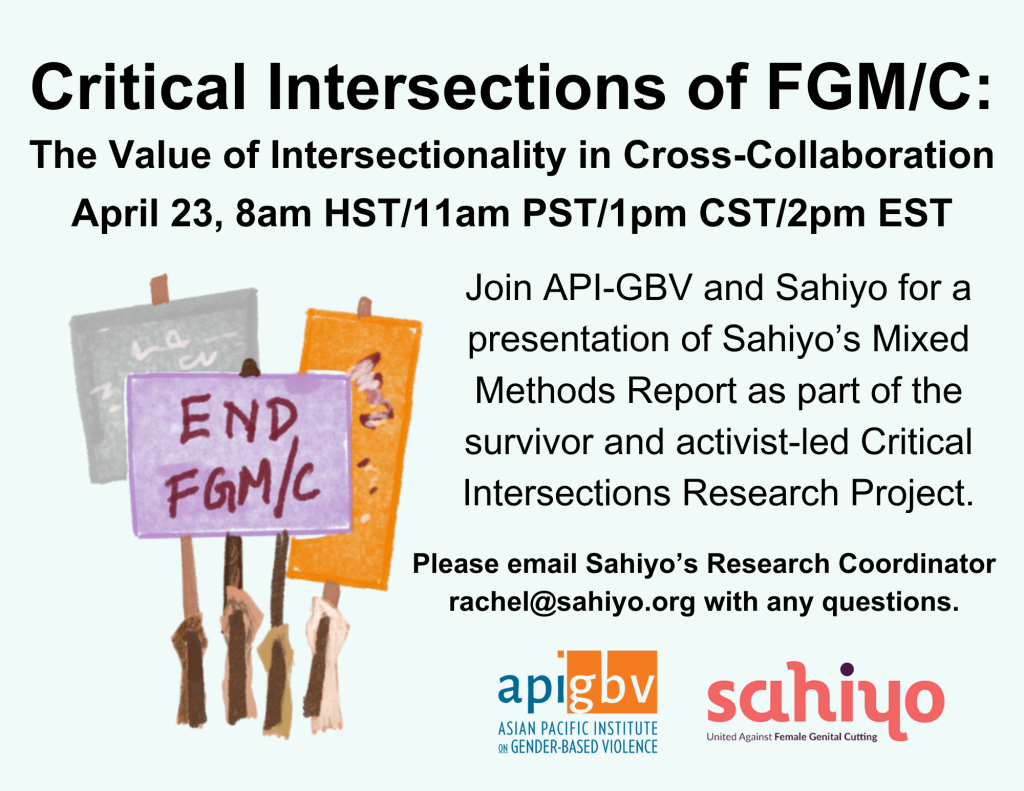
Sahiyo is excited to announce an upcoming event tied to our survivor and advocate-led Critical Intersections Research Project! This original research, which has been in development for over two years, examines the issue of female genital mutilation/cutting (FGM/C) through an intersectional lens. This includes an analysis of media on the topic (published in our first report), as well as data from a mixed-methods survey (published in our second report) and in-depth qualitative interviews (to be published later in 2024). The project seeks to understand both challenges that FGM/C survivors and activists face, as well as opportunities for cross-sector collaboration with other social justice movements. Critical Intersections of FGM/C: The Value of Intersectionality in Cross-Collaboration, hosted by API-GBV, will focus on collaborative aspects of social justice work. In hopes of facilitating meaningful discussion around cross-sector collaboration and intersectional programming, this presentation shares challenges and opportunities to collaborative projects found in our research, with plenty of time for feedback and weigh in from the audience. Because turning data into action is the goal, and Sahiyo continues its exploration on this topic, we hope to expand our understanding with the insights of activists, frontline professionals, and other attendees of this event. Event Date: April 23rd Event Time: 2:00-3:30 PM EST Registration: https://us02web.zoom.us/meeting/register/tZModOypqT0qG9BpxXwUcL_lIiFmUOSP_l49#/registration
Sahiyo releases new research report on February 6th

Sahiyo U.S. is excited to announce the publication of Examining Intersections Between Female Genital Mutilation/Cutting And Social Oppressions: A Mixed Methods Study, the second of three reports from our Critical Intersections Research Project. Inspired by our 2021 webinar, and building upon themes derived from our initial body of work released in 2023, this new report is based on original research from a mixed-methods survey with over 100 respondents, including individuals and organization that work within and beyond the FGM/C sphere. We are proud to share this report on February 6th, International Day of Zero Tolerance for FGM/C, as part of our survivor and advocate-led original research project. The report examines two main forms of oppressions intersecting with FGM/C: systemic forces, including discrimination within institutions, as well as interpersonal and communcal factors, such as discrimination within practicing communities and the anti-FGM/C movement itself. This body of work also identifies challenges and opportunities for cross-collaboration with other social justice movements and provides recommendations for how to implement this intersectional work. This research is meant to support advocates working in FGM/C to better understand how these intersecting oppressions affect the movement to end FGM/C, and connect fellow activists and social change makers to understand the larger forms of inequity at play and unite in ending these universally oppressive systems. We aim to strengthen anti-FGM/C efforts by addressing the roots of inequity and inequality and to create stronger collaborative movements across various human rights issues. Read the report here. Learn more about the Critical Intersections Research Project here.
Sahiyo publishes second report from Critical Intersections Research Project

Sahiyo U.S. is excited to announce the publication of Examining Intersections Between Female Genital Mutilation/Cutting And Social Oppressions: A Mixed Methods Study, the second of three reports from our Critical Intersections Research Project. Inspired by our 2021 webinar, and building upon themes derived from our initial body of work released in 2023, this new report is based on original research from a mixed-methods survey with over 100 respondents, including individuals and organization working within and beyond the FGM/C sphere. We are proud to publish this report, as part of a survivor and advocate-led original research project, on February 6th, International Day of Zero Tolerance for FGM/C. The report examines two main forms of oppressions intersecting with FGM/C: Systemic forces, such as discrimination within systems and institutions, included intersections between several forms of oppression such as xenophobia and racism with institutions like law enforcement. Many survey participants identified fear of the criminal justice system as a challenge for survivors and the end FGM/C movement; interestingly, a majority of every group reported to work with the legal system and law enforcement (in and beyond the FGM/C sphere). Interpersonal and communal forces, such as discrimination from within practicing communities and the movement to end FGM/C, introduced complexities for survivors and activists alike. Interestingly, individuals working in the FGM/C sphere most commonly identified interpersonal challenges (rather than systemic forces) such as gender discrimination and other forms of gender-based violence as challenges that girls and women in FGM/C-practicing communities face. Additonally, a strong discord around the framing of FGM/C (‘mutilation’ vs. ‘cutting’) suggested a significant barrier to collaborating within the FGM/C sphere and beyond. Lastly, the study examined the potential for cross-collaboration between the anti-FGM/C sphere and other social justice movements. Though participants reported an overwhelming desire for cross-collaboration across the demographic groups, they also identified many significant challenges for meaningful cross-collaboration. Participants also provided opportunities for collaboration. From the various challenges, opportunities, and intersections of oppressions, eight recommendations for cross-sector collaboration and intersectional work involving how to work toward ending FGM/C were gathered. This research is meant to support advocates working in FGM/C to better understand how these intersecting oppressions affect the movement to end FGM/C, and connect fellow activists and social change makers to understand the larger forms of inequity at play and unite in ending these universally oppressive systems. We aim to strengthen anti-FGM/C efforts by addressing the roots of inequity and inequality and creating stronger collaborative movements across various human rights issues. A special thank you to the Wallace Global Fund for funding this project! Read the full report here.
Presenting the Critical Intersections Research Project to The Girl Generation
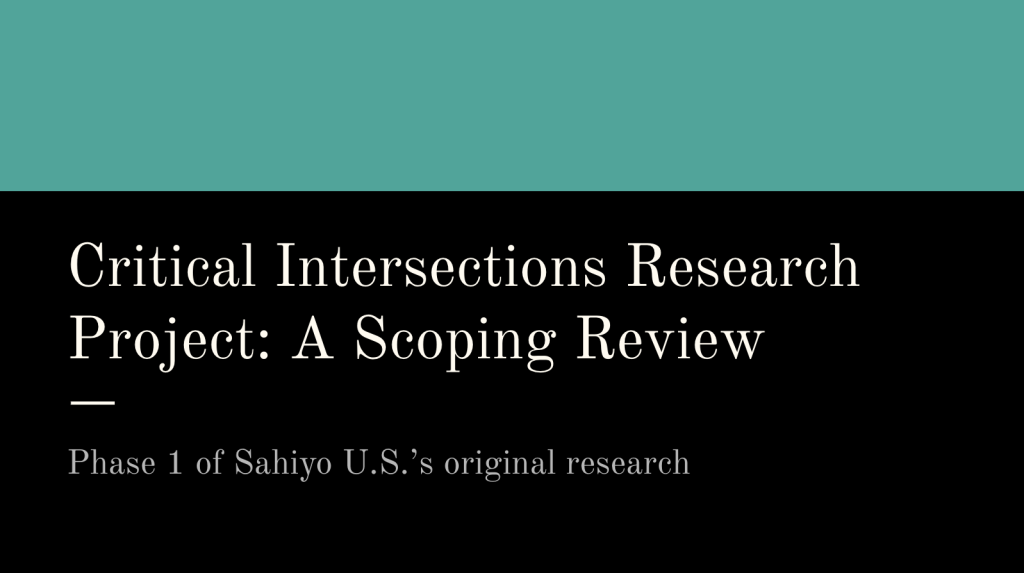
On November 21st, Sahiyo’s Research Coordinator, Rachel Wine, and Training and Technical Assistance Coordinator, Aries Nuño, presented findings from the first stage of Sahiyo’s Critical Intersections Research Project to The Girl Generation. The findings, published in the Examining the Current State of Critical Intersections: Female Genital Mutilation/Cutting and Social Oppressions report in October, were derived from a scoping review on the topic of intersectionality. More specifically, this report explores connections between the anti-female genital mutilation/cutting (FGM/C) sphere and other social justice movements, as well as the complex identities of survivors and activists, through an array of literature such as peer-reviewed literature, editorials, opinion pieces, reviews, and social media communications. The presentation shared background information on the Critical Intersections Research Project, tracing its roots back to Sahiyo’s 2021 public webinar titled Critical Intersections: Anti-Racism and Female Genital Cutting (FGC). Additionally, the presentationexplored the seven core themes derived from our scoping review: Religion, Race, Bodily Autonomy, Queer Gender & Sexuality, Feminism, Law & Policy, and Climate Change, highlighting how they intersect with FGM/C. Lastly, Aries and Rachel detailed the next steps for the project, including the publication of two reports on original mixed-methods research, expected in 2024. The Sahiyo team was thrilled to be met with questions from The Girl Generation about the various core themes derived from the research, as well as some findings to be shared in the upcoming reports. Many thanks to Esmael Omar for helping make this opportunity a reality! If you or your organization are interested in hosting a presentation on Sahiyo’s Critical Intersections Research Project, please contact rachel@sahiyo.org and aries@sahiyo.org for more information.
